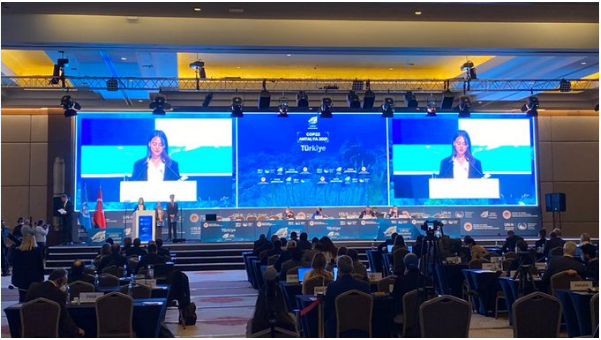SCP/RAC at COP22: taking the pathway towards a sustainable future, grounded in eco-innovation and sustainable business models
During COP22, a series of promising and encouraging decisions on circular economy, driven by the SCP/RAC, have been adopted by countries, contributing to regional efforts aimed at a green recovery in the Mediterranean. As a first step, countries adopted the very definition of the term “sustainable business”, acknowledged by the countries as key drivers for the Green and Blue Economy in the Mediterranean region. While all businesses must adapt to their political, social and economic context and operate within regulatory and institutional constraints, green and circular economy businesses often face additional challenges such as establishing a secure foothold in the market, staying competitive with other businesses that do not internalize the costs of environmental and social responsibility, limited opportunities for building capacity on sustainable business practices, and access to financing. The definition, based on a first proposal made by Burcu Tuncer and Giorgio Mosangini (Circular economy business strategies, 2020), is an important step in the work to promote harmonization of policies and approaches among regional actors.
With the same objective, the countries then adopted a set of 12 Regional policy measures presented by SCP/RAC, to support green and circular economy businesses in the Mediterranean. This measure is expected to increase the adoption of eco-innovation techniques among businesses, generate new green jobs and strengthen demand for more sustainable products, acting as a stepping stone in consolidating the countries efforts towards a more circular Mediterranean.
All these measures come to provide additional and elementary support to the Switchers, a community hosted by SCP/RAC, of more than 300 entrepreneurs and change makers leading the shift to green and socially inclusive economies in the Mediterranean. Flag bearer of the Switchers during this COP22, the catalan entrepreneur Aina Pujol conveyed a message to the participants: “The youth of the Mediterranean have the common will to make change, but lack the resources”. She took part in the Ministerial Session as Youth representative alongside H.E. Mr. Murat Kurum, Minister of Environment, Urbanization and Climate Change of the Republic of Turkey and Ms. Joyce Msuya, Deputy Executive Director of UNEP, who congratulated Aina Pujol and the other two youth representative Faik Yetkin from Turkey and Asma Tarek from Egypt “on their efforts for the people and for the planet” stating that “They are shining examples of the power of youth to help protect the Mediterranean Sea”.

